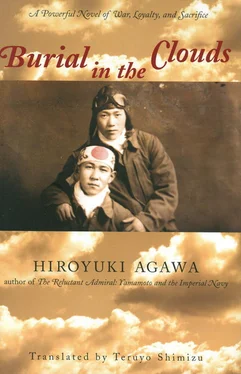Surely we will succeed in the important work entrusted to us. We need not necessarily take a grim view of the progress of the war. The 13th Class of student reserve fliers will bear up to hold the tide at its present level, and we of the 14th Class will make a rally. Today is the day of the Boy’s Festival, and though we have neither rice dumplings nor carp streamers to mark the event, I feel a kind of manly pride. As for our day-to-day life at the new station: I should imagine we will be allowed more letters, and the food might be better, too. Before long we will be commissioned, and the gloom will be swept out of me. I know I had better not let my hopes run after my desires, lest I be disappointed, but what a delight it will be to leave this place! The word is we will be allowed visitors on the 14th. This might be the last chance we ever have to see our parents, so the division officer says we must be in good spirits, make the most of the occasion, and eat as much as we please— ohagi , red rice, what have you.
Strangely enough, today I had the queerest dream, at dawn, on the day of the announcement of our new assignments. I have never been superstitious, but from this point forward I can’t help but believe in the separation of the soul from the body. I was back home in Osaka. I opened the door to the bookcase in my room, took from the right end of the second shelf my copy of Poems for the Reverend Emperor, and read it. I saw no one from my family. The blue curtain that hangs over the glass doors of the bookcase, however— that remains vividly before my eyes. I would be willing to say this was nothing but an ordinary dream if it weren’t for that particular book, a book I had bought just before joining the navy, and which I had never had the chance to so much as open. But in my dream I opened it, and there can be no doubt that I read “San-ten-ka,” a poem by an obscure author that deals with General Maresuke Nogi, a hero of the Russo-Japanese War, and his sons Katsusuke and Yasusuke. The poem celebrates the valor of both the father and the sons, and at one point in it the General, having escorted the great Emperor Meiji to the grave, puts into words his feelings toward his two sons, who had earlier fallen in battle. The following passage is particularly exquisite.
I am eternally grateful
To the late Emperor for his favors.
How can I bear to go home again now?
And the new Court has no need of councilors.
So, my old legs run after the funeral hearse.
Where are you, my sons?
Already I am eight years behind you in death.
But I am coming, together with your mother,
As we attend the Imperial hearse.
I am sorry to have made you wait so long.
I remembered the poem clearly from the dream. I found this so odd that I asked Wakatsuki, who happens to own the same book, to show me his copy, and as I turned to the page an uncanny sensation overcame me. The poem was just as I had seen it in my dream, almost to the letter. I do not know how to interpret this incident, other than to say that my soul left my body as I slept and returned to my hometown. If our souls do what our bodies plainly cannot, if they are endowed with perception as mine was in this dream, then I simply cannot believe that the complex activity of the mind is extinguished at the point of death, or that it is buried in the grave with the flesh. This notion heartens me, and gives me courage. Most definitely some sort of kinship affiliates sleep and death, and the question might not necessarily lie beyond the reach of science. Instead, this may be a matter that awaits scientific confirmation at a future date. Simply because science cannot at present explain a thing, and for that reason takes a dismissive view of it, we shouldn’t sweep it all aside as “superstition.” At least, I certainly cannot disregard the miraculous dream I had this morning.

Notes by Akira Fujikura
May, Showa 19 (1944)
Tsuchiura Naval Air Station
Professor E.
Please excuse me for ever having been so discourteous. It has been quite a long time since I sent you so much as a simple greeting. In fact, it was right after I first joined the navy, at Otake, and all the while I have been receiving kind letters from you.
I assume that you have already heard from Yoshino or Sakai that we are allowed only one postcard per week. That is one of my excuses, but there was another reason why I chose not to write you for such a long time. So far as my parents and siblings are concerned, I can content myself with saying to them the sorts of things the censors permit us all to say, but I simply could not persuade myself to send so artificial a note to you. For the same reason, I have scarcely written to my oldest and closest friends. Of course, there were times when I almost wrote you to say that I was dashing about, right as rain, hopping into gliders, shouldering heavy machine guns, and gripping the fat oars of a cutter, that my weight had risen to sixty-five kilograms, and that I enjoyed splendid health, and often recalled debating with you as we ate pork cutlet at Ogawa-tei. But each time the result was peculiarly hollow, and each time I tore up the letter and trashed it. Sure, I remember the pork cutlet at Ogawa-tei, and I now weigh sixty-five kilograms. It’s all true enough. But I couldn’t banish the thought that there is something else I must write, something of my true feelings—something of which I want you, at least, to have some knowledge before I end this life of mine (which might not last much longer).
There is no reason I should be so ceremonious, but that, anyway, is why I have chosen to write for you, bit by bit, and as I find time to spare, something between a letter and a note of my impressions, and to send it all to you once it is done. And I shall be grateful if you accept my complaints as those of a man who harbors his warped, unspoken views and can direct them to no one else. Needless to say, this letter would never pass the censors. However, we will leave Tsuchiura Air Station soon for a flight training base in a town called Izumi, way down in Kagoshima. We should be allowed to see our families, if only briefly, during the journey, at Shinagawa Station in Tokyo, and, in Kansai, either at Kyoto, Osaka, or Kobe Stations. My thought is that on one of these occasions I may have a chance to deliver this letter to you by means of someone I can trust. With that hope in mind, I’ve started writing today.
It has been exactly five months to the day since we joined the navy. My life here is utterly lonely. To be lonely in the military is most peculiar, it seems. I live in close contact with the naked flesh of hundreds, even thousands, of other men, shoulder to shoulder, day and night, leading a lively, tumultuous life, always on the move. But when I escape for a moment from all the rush, an overpowering desolation cuts me deep, as if I were totally abandoned in an empty, tranquil wilderness. My heart bonds with nothing, never once have I laid bare my feelings. This loneliness differs completely in nature from the solitude I knew as I studied in my second floor, four-and-a-half tatami room in the Hyakumanben district near Kyoto University, warming my hands over a hibachi on cold winter nights, yet satisfied in the belief that I was doing work that related to the world.
My only consolation is that Sakai and Yoshino are here with me. Still, I rarely get the chance to speak with them in a relaxed sort of way. Besides, both men have changed considerably, each in his own way, over the course of the last five months. As a matter of fact, this place changes every living soul. We have ceased to talk about the Manyoshu. Everyone is trying his best, under a bitter trial, to find some sort of anchorage. I am by no means being sarcastic when I say that Sakai and Yoshino are, after all, uncommonly modest and supple at heart, compared to myself. We know that in order to survive as military men or as naval officers, and above all to face the shadow of death that looms before our eyes, we must have a firm sense of ourselves. We accept that, obediently. In fact, we are more than willing to re-create ourselves for the purpose at hand, when all we ever get drilled into us, by the chief instructor, the division officers, the flight instructors, the daily newspapers with their infamous tone and their conveniently selected extracts from books, is the necessity of carrying through this holy war to its end, our responsibilities as honorable youths, the glorious tradition of the Imperial Navy, and the ideal of “the whole world under one roof.” Neither Sakai nor Yoshino has ever been blindly fanatical, and I wouldn’t necessarily call them that now, but their critical, skeptical air seems to be diminishing with repeated exposure to all these mantras. First, they began to think that the slogans weren’t entirely empty, then they were persuaded that they actually made some sense, and finally they came to believe that these slogans were absolutely right, and that all along only their own “deficient consciousness” prevented them from seeing the light. At least, they seem to be moving in this direction. I stand alone in my pigheaded inability to abandon my suspicions. I could never assume the “spiritual” frame of mind that the instructors demand of me, and yet I can’t figure out for sure what to do about my future. In point of fact, that timid Sakai (and maybe this is precisely because he is timid) recently declared that he has begun to fathom the deep meaning of the phrase, “We shall be united into a single Emperor.” He is even prepared to espouse the theory that we never truly understood the Manyoshu, which is, after all, a collection of “ethnic” poems, because we failed to comprehend this great spirit of “being united into a single Emperor.”
Читать дальше













